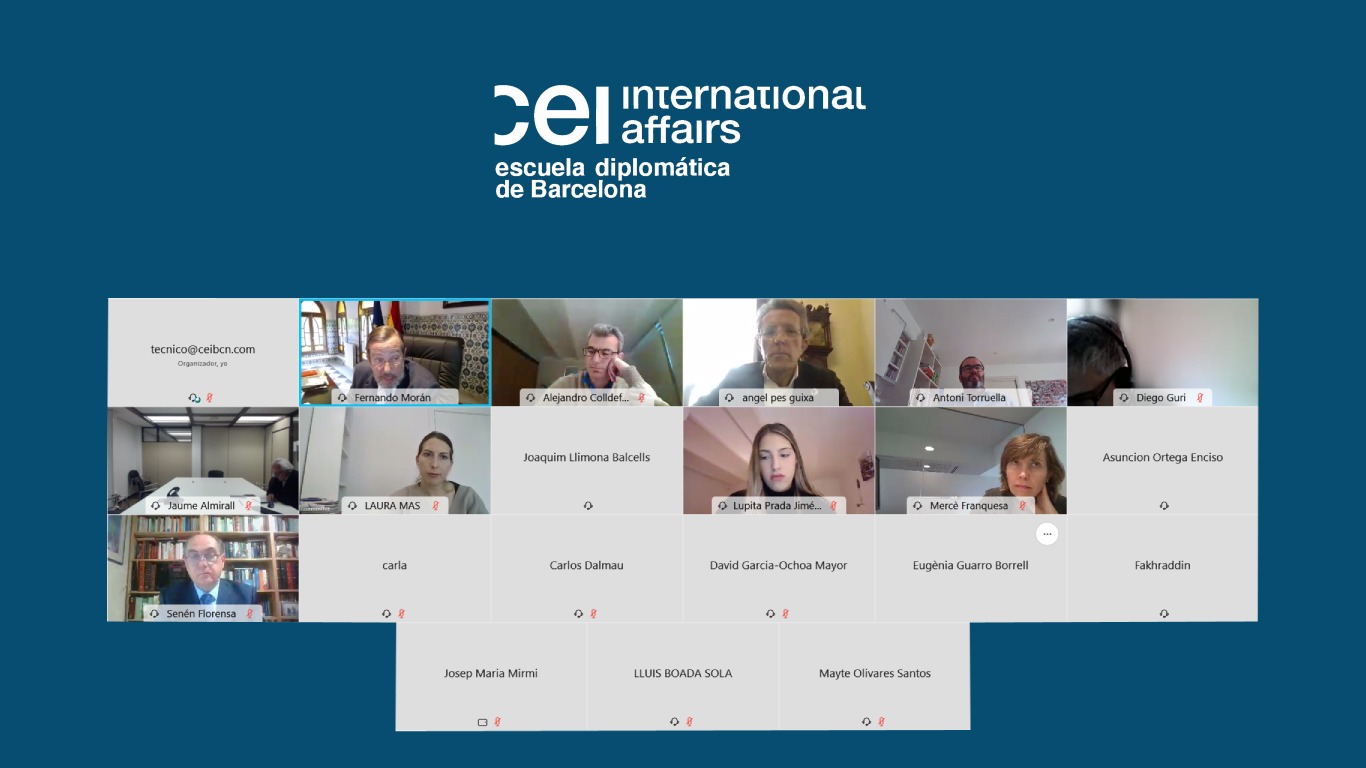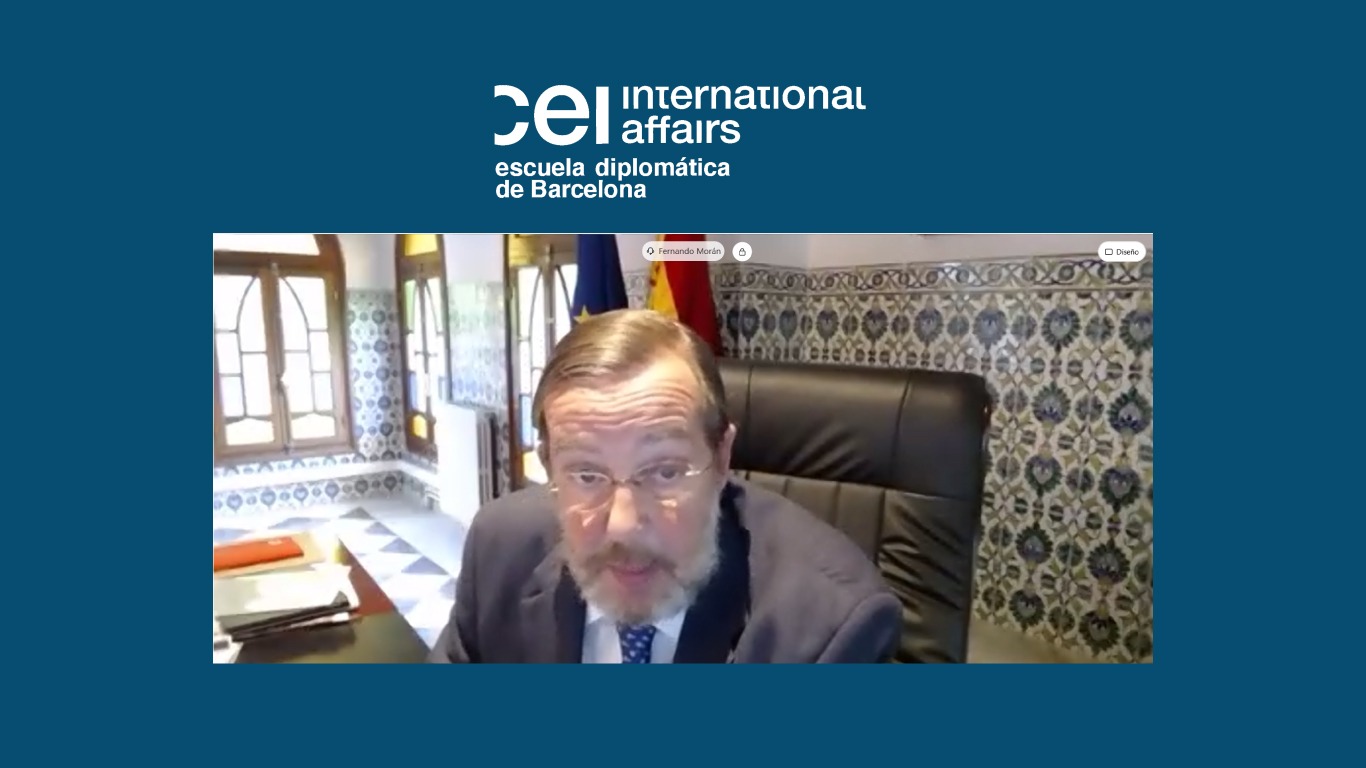On Tuesday, February 23, 2021, a virtual meeting was held with the Ambassador of Spain in Algeria, His Excellency Mr. Fernando Morán. The event, organized by the Centro de Estudios Internacionales, in collaboration with the Cercle d’Economia, had attendees from different companies and members of the CEI Executive Club.
The conference began with an introduction by Ambassador Senén Florensa, a highly experienced diplomatic official and current president of the Executive Committee of the IEMed. In his speech, Ambassador Florensa began by highlighting that there is an important time for the relationship between Algeria and Spain, and with the other Mediterranean countries, since it is 25 years since the start of the Barcelona Process and 15 years since the signing of the Algeria’s association treaty with the European Union. The Ambassador made a brief analysis of how the Barcelona Process has evolved since its establishment, highlighting in the first place that in the political sphere there have been certain difficulties due to the various wars that have occurred in the East. He then explained that at the economic level there have been great advances in modernization, and that, at the cultural level, the changes have been significant due to the changes in mentality that occurred and led to the questioning of the traditional Arab state, and resulted in the well-known Arab Spring.
Then, Ambassador Fernando Morán took the floor, who began by making a general review of the Algerian political situation. Here he highlighted the important transformation process that the country has undergone since 2019 with the arrival of President Abdelmadjid Tebboune. The arrival of this president to the country was turbulent, since prior to his accession to the presidency, the Hirak opposition movement mobilized thousands of Algerians to the streets, in protests that lasted about 10 months and that led to the December 12, 2019 elections. By winning those elections and taking office, President Tebboune carried out a major political reform that included a new constitution, a new electoral law, and a call for parliamentary elections. These elections, according to the Ambassador, will take place before May 19, but it is feared that, taking place in the middle of the month of Ramadan, the campaign process will be complicated.

Then, the Ambassador went on to discuss the bilateral relationship between Spain and Algeria. Here he emphasized that Algeria is the country with which the most high-level meetings have been held, seven so far. He also highlighted the significant cultural relations, within which there are more than 100 agreements between Spanish and Algerian universities, and where the Cervantes Institute is the third in the world by number of students, thus demonstrating a great interest in the Spanish language and culture by the Algerians.
Finally, the Ambassador presented the situation of bilateral economic relations with Spain. Algeria is a country dependent on its oil and gas exports, and therefore the economic relationship with Spain focuses on this sector. The Ambassador commented that, in general, there has been a decrease in imports and exports between both countries in the last 2 years, since on the one hand Spain exported 3,300 million euros in 2018 and only 1,700 million in 2020, and the other Spanish imports were 4.666 million euros in 2018 and in 2020, there was a reduction to 2.258 million. With these figures, therefore, the Ambassador emphasized the significant reduction in trade flow. Additionally, he added that, in 2019, the flow of investments was zero, since no Spanish company invested in Algeria. Despite this, the Ambassador emphasized that Algeria is a priority market for Spain, since they constitute 1% of Spanish sales, and are the second client on the African continent behind Morocco, and third African supplier also after Morocco and Nigeria. Finally, he reported that the Embassy is working hard on this issue in order to open the way for more Spanish companies to take advantage of the Algerian market.
During question time, Ambassador Senén Florensa took the floor again, asking Ambassador Morán about how the lack of interest of Spanish companies in investing in Algeria can be explained. To this, Ambassador Morán replied that, until June 2020, there was a law that required 51% of the capital of any company that he invested, to remain in Algerian hands. This law has already been repealed, so the Ambassador expressed his hope that more companies would invest in Algeria, especially after the last visit of the President of Spain, Pedro Sánchez, who was accompanied by representatives of various companies. Then, the director of the CEI, Ángel Pes, asked about the perception that exists that it is only possible to invest in Algeria through the public sector, and about what possibilities exist for the private sector to invest without having to resort to the public sector. To this, the Ambassador commented that, although the issue is not well developed, it has had growing importance. He added that there are Spanish business groups that have executed projects with private companies, and that in the field of agriculture this has been more evident. The Ambassador pointed out that it is an issue that must continue to be worked on because there are positive experiences.

Finally, the audience asked questions related to the emergency caused by the COVID 19 pandemic and its impacts in Algeria. Ambassador Morán stressed that, in the economic sphere, the government is trying to approve a new roadmap to diversify its economy and expand other sectors such as automotive, agriculture, and renewable energy, in which Spain can have an important investment opportunity. In general terms, the Ambassador reported that Algeria has implemented similar measures to combat the pandemic, such as curfews and closures of certain economic sectors. Currently, the vaccination plan has started, but the authorities fear that, in the month of Ramadan, which normally consists of many festivities in the streets and with large crowds, the cases will increase significantly.
In short, the virtual event on this day was of great interest to all the guests and the presentation by both speakers made it clear that the bilateral relationship with Algeria has been worked on and continues to work for the collective good of both nations.
Report prepared by: Lupita Prada Jiménez